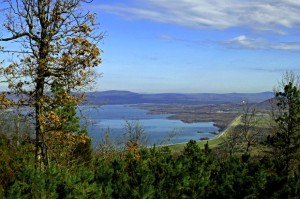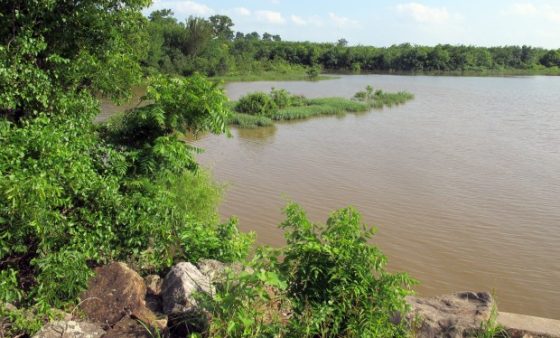Sardis Lake

gmeador / Flickr
Sardis Lake is at the heart of the dispute over who controls water across southeast Oklahoma
The State of Oklahoma, the Choctaw and Chickasaw Nations and the City of Oklahoma City are in federal court, fighting over the rights to water in Sardis Lake. But while this fight centers on a small lake in southeastern Oklahoma, the outcome of the case could change how government controls the rights to Oklahoma’s most water-rich region.
Historic Claim
The State of Oklahoma has been allocating water rights for more than 100 years — since statehood. But that could change if the Choctaw and Chickasaw Nations are successful in a federal lawsuit that asserts their authority over water throughout southeast Oklahoma.
The tribes claim the water has belonged to them since before the Civil War.
The tribes base their claim on the 1830 Treaty of Dancing Rabbit Creek, which established the Choctaw Nation. Proponents of the tribes’ position say, along with the land, the Choctaws got the rights to the water in minerals in their territory as well.
While the Choctaw and Chickasaw Nations were never explicitly disbanded by law, the state says the tribes’ decision to side with the Confederacy during the Civil War — and later, statehood — had the same effect, and their rights to the water were lost in the process.
The Fight Today
The tribal lawsuit is on hold while the parties involved in the case negotiate outside of court. Oklahoma City is part of the suit as well. It was the city’s decision to move forward with a pipeline that would bring water from Sardis Lake, in southeast Oklahoma, to OKC that caused the Choctaws and Chickasaws to sue.
- June 2010: Oklahoma Water Resources Board approves transfer of Sardis Lake storage rights to Oklahoma City.
- August 2011: Choctaw and Chickasaw Nations sue to stop water from being taken out of historically tribal territory.
- January 2012: Negotiations begins among the parties in the case after a federal judge puts the lawsuit on hold.
There’s no telling how long the talks will last, or who will end up controlling southeast Oklahoma’s water after the case is settled, which could take decades if states like Wyoming and New Mexico — where similar conflicts have arisen — are any indication.
Wyoming has been trying to work out tribal water rights in the Big Horn River Basin for 36 years. It took New Mexico more than four decades to determine Pueblo water rights there.
Latest stories
Former Governor Walters: Don’t Waste Oklahoma’s Water, Sell It To Texas
In a commentary piece from NonDoc, Walters, a Democrat who served from 1991-1995, says 30 billion gallons of unused water flows into the Red River each day, and capturing and selling just a small portion of it could end the state’s financial problems and make southeast Oklahoma’s economy boom.
From the Desert to Oklahoma’s North Pole, A Woman Who Made Water Her Mission
The lakes and streams of southeast Oklahoma are vital to the area’s economy, and Broken Bow resident Charlette Hearne has made it her mission to stand in the way of attempts to move water out of her part of the state.
Obama Signs Bill That Officially Ends Southeast Oklahoma’s Tribal Water Fight
The bill’s signing brings a formal conclusion to the years long dispute between the state and the Choctaw and Chickasaw Nations over control of water in Sardis Lake and across southeast Oklahoma.
Inhofe Pledges to Fast-track Oklahoma’s Tribal Water Deal Through Congress
Oklahoma officials and the Choctaw and Chickasaw Nations spent 5 years hammering out a deal to share control of water across southeast Oklahoma, but coming to an agreement isn’t the end of the process.
With Water Settlement Inked, Tribes Now Selling The Details Back Home
After five years of confidential negotiations, the Chickasaw and Choctaw Nations have reached an agreement with the State of Oklahoma over water in southeast Oklahoma. The deal has been praised by state leaders as a historic accord that ends the tribes’ lawsuit that blocked Oklahoma City’s plan to pump water out of the region. But the deal still has to be sold to tribe members in that part of the state.
Inside the Landmark State and Tribal Agreement That Ends Standoff Over Water in Southeast Oklahoma
The deal, announced Thursday, clears a path for Oklahoma City to pump water out of Sardis Lake — a plan city officials say is essential to meeting the metropolitan area’s long-term water needs — which the tribes blocked with a 2011 lawsuit in the U.S. District Court for the Western District of Oklahoma.
Fallin Gave Southeast Oklahoma a Seat on Water Board, But Skips Deadline to Fill It
Southeast Oklahoma has many of the state’s largest lakes and rivers and most of the state’s water, but no one from the area serves on the Oklahoma Water Resources Board, the state’s water regulator. A 2013 law requires the area to have representation. But, so far, that hasn’t happened.
Fight Over Sardis Lake Entangled in Ancient History, Indian Culture and Sacred Water
Despite losing their homeland, and being pushed aside to build southeastern Oklahoma’s lakes, a connection has developed between the water and the people here.
Sardis Locals Say Lake Economy Suffers As Southeast Oklahoma Water Fight Drags On
Oklahoma’s lakes drive millions of dollars of tourism to otherwise impoverished parts of the state. But the local economy around Sardis Lake is missing out.







